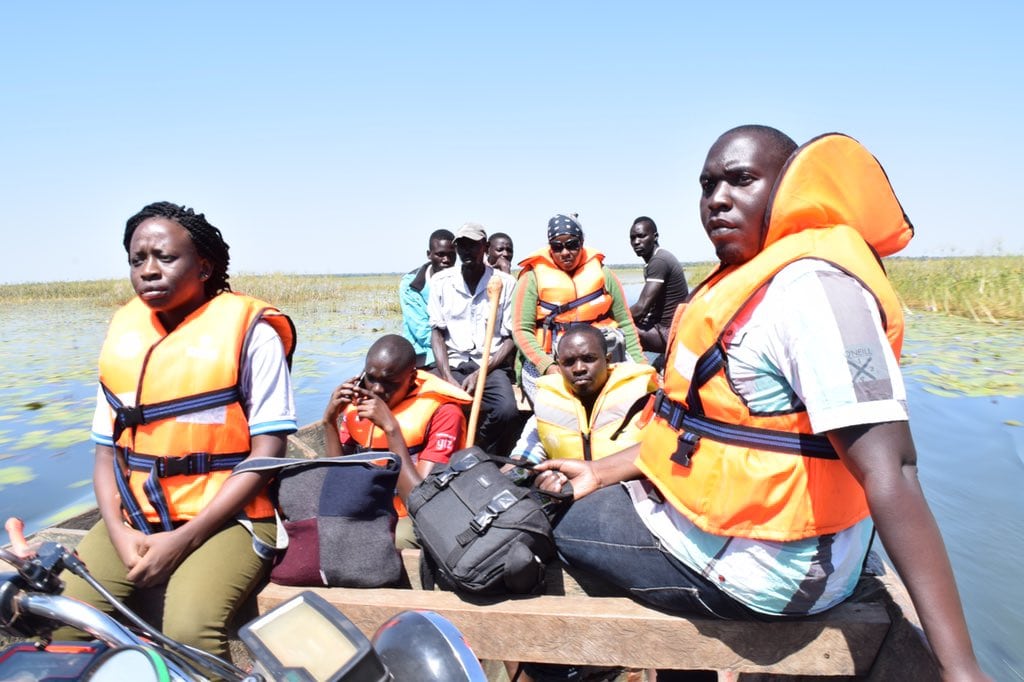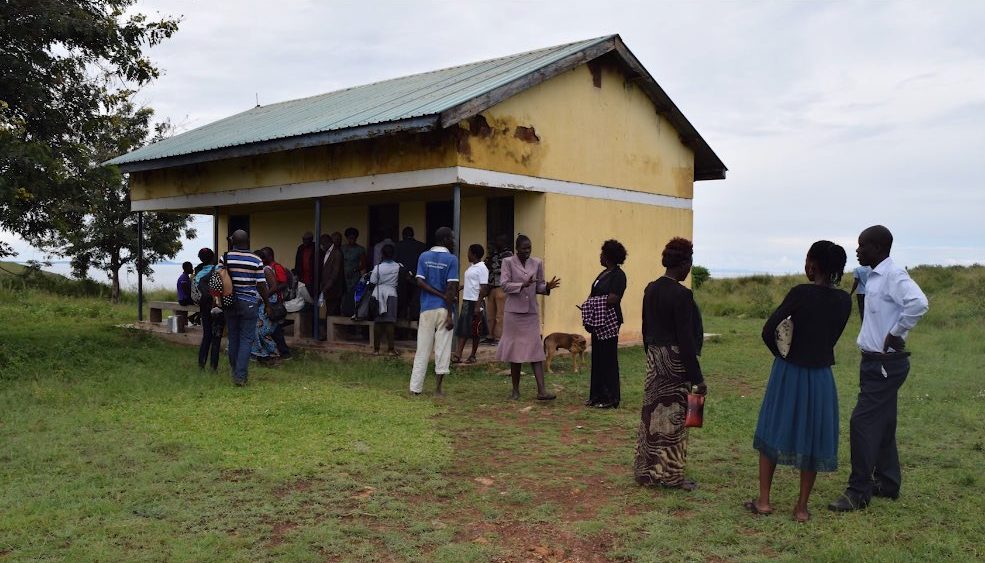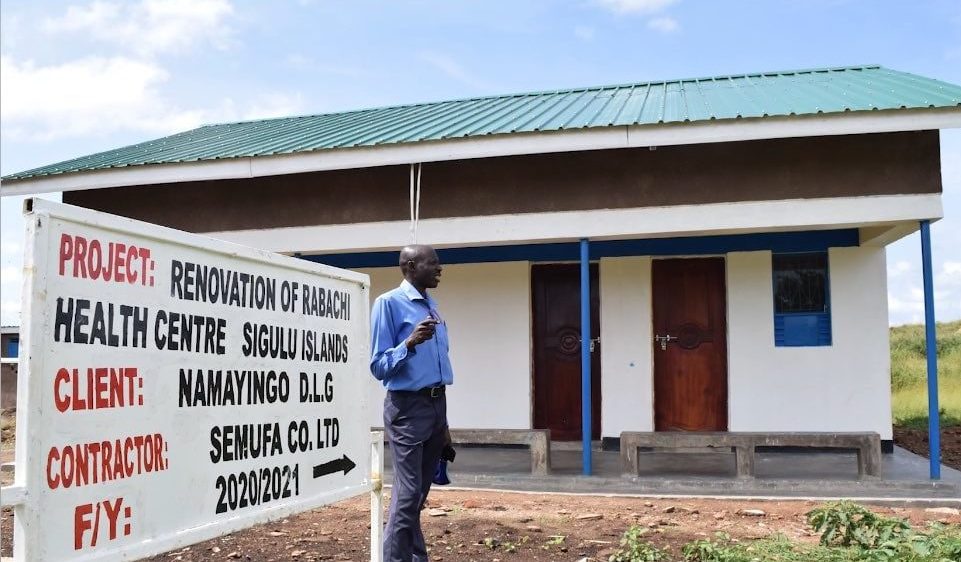A decade ago, the Fund gave an exciting new grassroots organization based in Uganda its initial seed funding—a grant of $5,000. Since then, the Initiative for Social and Economic Rights (ISER) has grown into a dedicated champion for the rights of Ugandans. And this year, we’re thrilled to be celebrating ISER’s 10-year anniversary with them—a tremendous milestone for this inspiring group of human rights defenders.
A Decade of Growth
ISER was founded in 2012 by a group of passionate human rights activists and advocates. According to Angella Kasule Nabwowe, ISER’s programming director, most Ugandan NGOs at the time were focused on humanitarian aid and development goals. ISER recognized the need for a holistic approach to social and economic rights—including the rights to education, health, housing, food, work, safe water, a healthy environment, and an adequate standard of living. But when they first developed their strategy, information and knowledge about these critical issues was in short supply.
The Fund—then only 10 years old itself—recognized from the outset that ISER could be an invaluable partner in protecting and promoting the rights of Ugandans. Investing in bold, new ideas has always been central to our principles and purpose. By taking risks on start-up initiatives, we’ve set ourselves apart as a funder—and have been privileged to accompany incredible groups like ISER along every part of their journey.
“The Fund gave the seed funding when ISER didn’t have all the requirements that the donor world needs for you to be able to get support,” recalls Maria Alesi, the Fund’s program consultant for Uganda. “It has been a very productive and very humbling partnership.”
With its initial seed grant from the Fund, ISER was able to draw up a strategic plan, conduct a mapping of social and economic rights in Uganda, and hire its first full-time staff member. ISER volunteers spent countless hours researching gaps in access to health, education, and state funding practices. Those first findings shaped their programming, centering the lived experiences of people who had been excluded from decision-making and making community participation a pillar of their approach.

Since then, ISER has developed into a fierce advocate for social and economic rights at the local, national, and regional levels. Their programming has expanded from two programs—focused on the rights to health and education—to include programs on social accountability and community participation, business and human rights, economic justice and social protection, and more.
“At all times, we have to ensure that we remain relevant to the context and that whatever we’re doing in terms of programming is serving the constituents that we seek to serve,” says Salima Namusobya, executive director of ISER.
A Decade of Impact
Sigulu Islands, off Uganda’s eastern shore in Lake Victoria, are home to more than 5,000 people. But in 2018, ISER discovered through its community outreach that the residents had access to only one health clinic, a bat-infested two-room building with a solitary volunteer. The next closest health facility was across the lake, with no emergency transport available to patients in need. ISER documented the ways in which the lack of healthcare was impacting the local community—especially women.
“Expectant mothers [had] been facing a challenge of getting maternity and antenatal care services,” says Wandera Hamala, a community advocate for Sigulu Islands. “Sometimes they [would get] a referral but they [could not] access the mainland for comprehensive services.”
Working hand-in-hand with community members, ISER petitioned Uganda’s Equal Opportunities Commission—decrying the lack of quality healthcare and recommending that a marine ambulance be provided. The commission brought the matter to the Ministry of Health. Thanks to the work of ISER, the local clinic was rehabilitated and, in 2021, the community received a ferry to transport patients to other facilities on the mainland.


Across the country, ISER has spearheaded similar efforts to protect people’s rights and improve services at every level. ISER works with stakeholders from government ministries, international agencies, local governments, and other human rights organizations.
When government-assisted schools raised tuition exorbitantly, ISER protested and took the government to court for failing to regulate fees. “ISER is always waking us up and saying, ‘Please, you are supposed to do this… why don’t you do your part?,’” says Mulinda Ismael, director of basic and secondary education at the Ministry of Education and Sports.
ISER also played a key role in developing and passing Uganda’s National Action Plan on Business and Human Rights in 2021. As more multinational extractive corporations move into the country, violating labor laws and harming the environment, the business and human rights plan provides a mechanism to hold them accountable.
“Social and economic rights advocacy by nature requires that you work at various levels,” says ISER Executive Director Salima Namusobya. “Our programming structure starts right at the grassroots. We work with communities and engage with advocacy at the district local government level. We also work at the national level, and then we have to also engage at the regional African continental level as well as the international level.”
A Decade of Partnership
Since 2012, the Fund has proudly supported ISER’s vital work. The strong relationship and mutual respect between both organizations has laid the groundwork for 10 years of enduring success.
“The story of ISER is, in many ways, the story of the Fund,” says Salima Namusobya.
“The Fund believed in ISER’s dream of changing the economic and social rights landscape in Uganda at a tender stage,” says Angella Kasule Nabwowe, ISER’s program director. “Over the years, Fund program officers have provided valuable guidance and insightful feedback on our work.”
“Seeing what the idea has become today—an institution with great systems and structures, doing amazing work that’s feeding into research for advocacy around economic and social rights,” says the Fund’s Maria Alesi, “For us, it is an honor to have been part of this journey.”